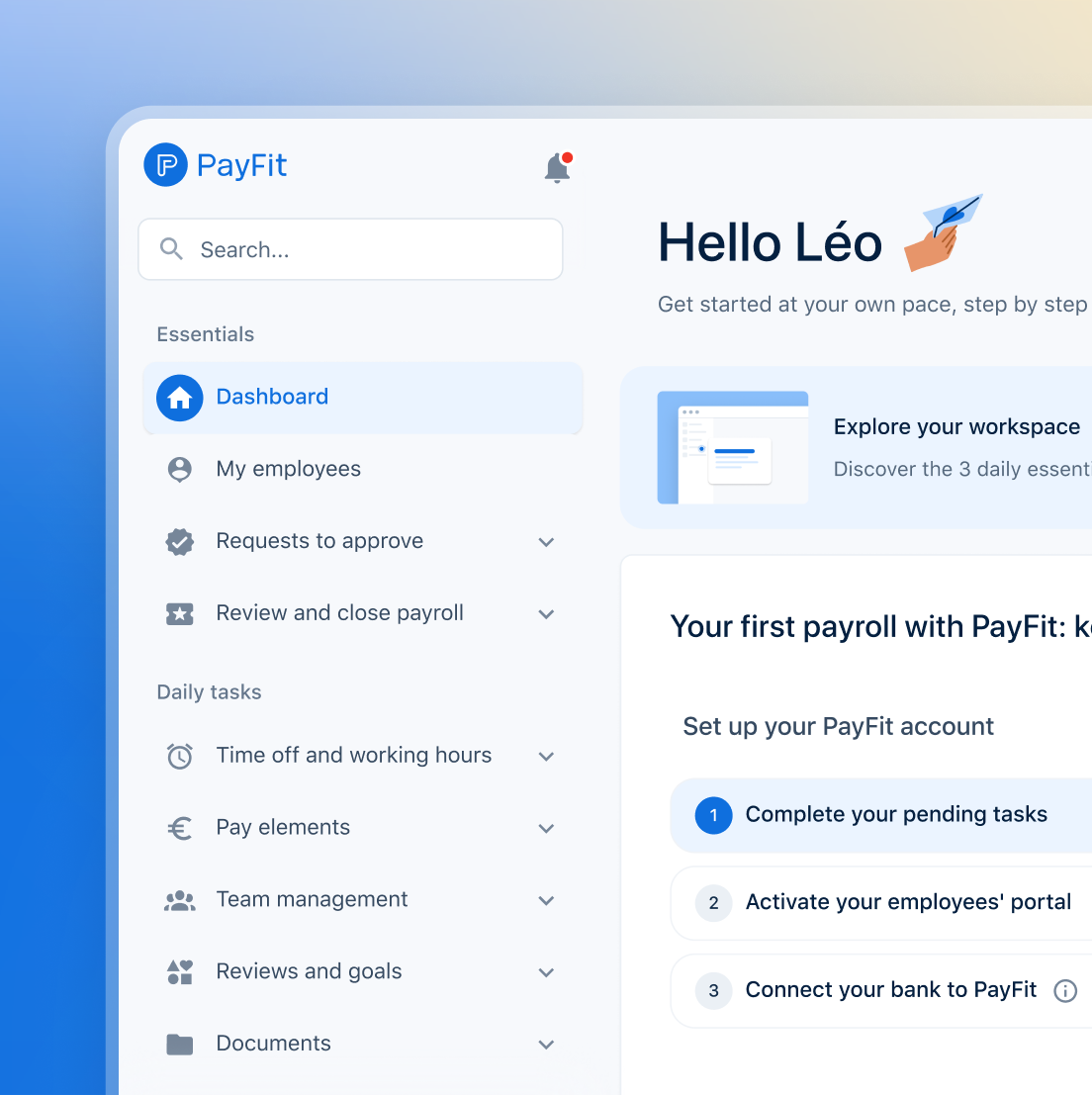✨ Health insurance, now in PayFit - learn more
💷 All the rates & thresholds you need to know for 25/26...right here
✨ The Payroll Journey: Start, Scale & Succeed Globally - learn more
✨ Health insurance, now in PayFit - learn more
💷 All the rates & thresholds you need to know for 25/26...right here
✨ The Payroll Journey: Start, Scale & Succeed Globally - learn more

2024’s CIPD Festival of Work invited attendees to ‘come curious, leave inspired’. It’s safe to say that last week’s event at ExCel London achieved its aim and then some. If you were there, hearing talks from some of the brightest brains in the workplace world and seeing an array of cutting-edge exhibitors plying their trade, then we’re sure you’ll agree.
And if you weren’t, then we hope to have captured some of that curiosity and inspiration in this event recap. We cover some of our favourite takeaways and soundbites, taking in talks from the likes of Alex Mahon, Chief Executive of Channel 4, groundbreaking AI thought leader Daniel Hulme, plus the thoughts of HR professionals in attendance.
We heard discussions on the biggest topics from the world of work right now, including AI, the employee experience, the future of work, fearless leadership, and more.
So, read on to get the lowdown - also featuring bonus dog content with the furry companions of The Cuddle Club!
Kicking off proceedings in front of a sizeable Workplace Transformation stage crowd, AI entrepreneur and academic Daniel Hulme’s opening keynote took listeners on a whirlwind tour of AI’s role in the workplace.
The mere fact that Daniel’s day job is Chief AI Officer for ad agency WPP speaks volumes about the role AI will play across businesses in years to come. An information and innovation-packed 25-minute talk covered topics such as decision-making, resource allocation, friction in business processes, leadership, and even the climate crisis!
The bottom line - AI isn’t necessarily coming for your HR job, but it will help you to perform radically better for your business. And if it does replace your existing job, it means you’ll be able to move onto one that’s more enjoyable, fulfilling and impactful.
Some key takeaways from Daniel’s talk:
AI can help humans take the shortest path to the right decision, when there are millions of possible outcomes (think of the decision making process as working out a route through a major city - the possibilities are endless!)
This means friction can be taken out of business processes
AI can also help put the perfect people on a particular project, by analysing skills, influence, hopes, dreams and desires
And it can even help solve the climate crisis (Daniel confesses to having helped businesses reduce their carbon footprint by as much as 25% using AI).
Another packed arena greeted the arrival of Culture Amp’s Lead People Scientist, Alex Alvarez. Addressing the aptly named Employee Experience stage (featuring a fantastic ‘silent disco’ style setup, with the talk piped directly into headphones for each audience member), Alex ran through the top priorities for People leaders to transform the employee experience.
He talked about the benefits of having engaged employees as a whole, including increasing the chances of receiving funding (and a company’s stock price). He stressed the importance of empowering people to get involved and contribute to decision-making, of employees becoming creators of culture rather than just consumers of it, and of fostering an environment of honest and constructive communication.
On this last point in particular, Alex asserted that facilitating psychological safety in the workplace can help to reduce groupthink, as different viewpoints can be considered, and forums for discussion created.

An incredibly hot topic, with not a spare seat in the house, three People thought leaders held an insightful pre-lunch panel discussion to talk about the future of work.
The hard-hitting session went as in-depth as time would allow, with Simon Reichwald, Dr. Sarosh Khan and Mel Forbes discussing everything from addressing skills barriers and an ageing workforce, to shifting workplace models and side hustles.
Dr. Khan touched upon the idea that people living longer meant they would be working longer too, the ‘profound implications’ for the role that work plays in our lives, and how employees need to be given the space to adapt their careers accordingly. Picking up the ageing workforce baton, Simon Reichwald wanted to stress that it’s in actual fact a great problem to have, as it will help companies to fill their skills gaps.
Following on from this, Reichwald was keen for People leaders to embrace untapped talent pools, create inclusive skills development programmes (graduate programmes have, he argued, been historically exclusive), and to address the barriers that might prevent an employee from doing something they love. It’s a point Dr. Khan made as well, imploring leaders to ‘stop and take stock’, and to consider whether people are being given truly meaningful work.
Perhaps the most crucial assertion of the session was from Forbes, who stated simply that 1:1s have never been more important.

Having grabbed some lunch and refuelled with the help of a delicious ‘all in one solution’ smoothie from our partner Personio, it was back to the main Workplace Transformation stage for a keynote from Channel Four’s Chief Exec, Alex Mahon.
Discussing fearless leadership, fostering an honest and open culture, and driving creative courage in the workplace, Mahon’s discussion with the CIPD’s Peter Cheese was an insightful one for current and aspiring leaders of people.
‘Honesty’ was a central theme of the session, covering the need to be honest about decision making, business strategy and bad news. We all want to hide from bad news, Mahon stated, but you’ve got to open up the conversation so you can hear the bad news. And, crucially, bad news has to go hand in hand with the action to remedy it.
For young people, just knowing what the decision is isn’t enough, she argued. They want to know how you got there too.
The pair then spoke about important attributes for leaders to show, the key one being curiosity. Listening to other people who have different experiences and opinions to you, Mahon said, is crucial, as is having the confidence to ask those around you what they think, and what the answer might be when you don’t know it yourself.

One of the most memorable experiences of the day was getting the opportunity to take a break from the talks and spend a few moments in the company of some furry companions.
Yes, over at the Wellbeing village, a group of dogs had been brought in by the people at The Cuddle Club, and in the company of them, their trainers, and some very welcome beanbags, we took a little time to relax, and to reset our information-filled brains.

At the end of a superbly organised and attended event, the thing that struck us the most was the obvious passion and care that People professionals have for their people. They see the potential and the brilliance in them, and want to nurture and support them. ‘People first, then profit’ was the overwhelming mantra that we took away from the talks and conversations, and it showed in the always-packed stages and high levels of engagement from those watching and listening.


Learn what an employee performance evaluation is, what to include, how to run effective reviews, and how to turn feedback into real improvement.

Corporate wellbeing programmes can support employee health, reduce stress and improve engagement. Learn what to include, how to launch, and which initiatives work best.

2026 strategic guide for UK finance and HR leaders on running effective employment engagement surveys, with top questions, methods & software solutions.

Employee performance management tools streamline reviews, goal tracking and feedback. Discover features, benefits and top UK options for small businesses.

Read our guide to performance appraisals, from their definition and purpose through to best practices and available tools for UK companies.

Employee Assistance Programmes can be a valuable tool for HR leaders to provide support and advice for employees. Find out about them here.

See what's new in PayFit
New features to save you time and give you back control. Watch now to see what's possible